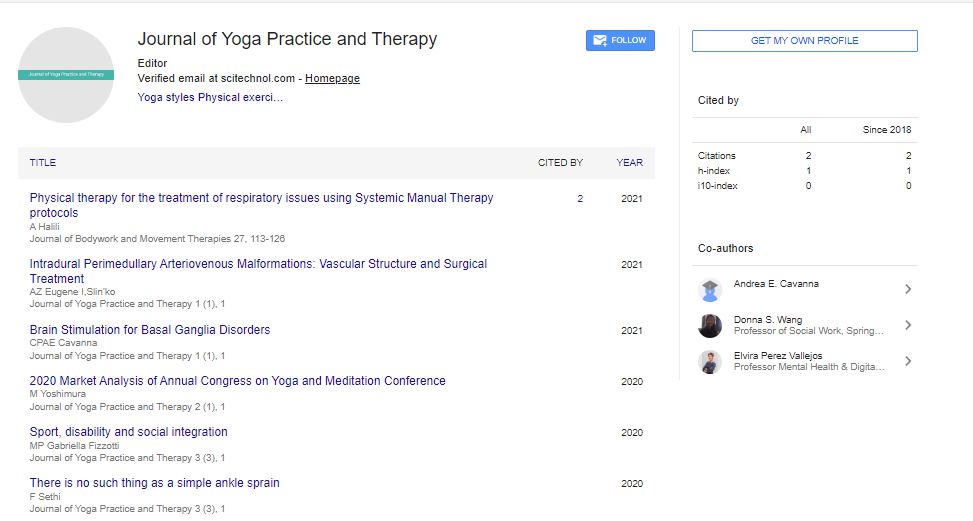Opinion Article, Vol: 6 Issue: 1
Healing Within a Comprehensive Guide to Yoga Practice and Therapy for Holistic Wellness
Suzanne C. Danhauer*
Department of Social Sciences and Health Policy (SCD), Wake Forest School of Medicine, Winston Salem, North Carolina, USA
*Corresponding Author: Suzanne C. Danhauer
Department of Social Sciences and Health Policy (SCD), Wake Forest School of Medicine, Winston Salem, North Carolina, USA
E-mail: danhauer@scihealth.edu
Received date: 27 February, 2023, Manuscript No JYPTY-23-95019;
Editor assigned date: 01 March, 2023, Pre QC No. JYPTY-23-95019(PQ);
Reviewed date: 15 March, 2023, QC No. JYPTY-23-95019;
Revised date: 22 March, 202, Manuscript No. JYPTY-23-95019(R);
Published date: 29 March, 2023, DOI: 10.4172/jypty.1000111
Citation: Danhauer SC (2023) Healing Within Comprehensive Guide to Yoga Practice and Therapy for Holistic Wellness . Int J Yoga Therap 6:1.
Description
Yoga is a holistic practice that encompasses physical, mental, and spiritual well-being. It is a comprehensive system that includes various techniques, postures (asanas), breathing exercises (pranayama), meditation, and ethical principles (yamas and niyamas) aimed at promoting overall wellness. When used therapeutically, yoga can be a powerful tool for healing and improving one's physical, mental, and emotional health. In this comprehensive guide, we will explore the different aspects of yoga practice and therapy for holistic wellness. Regular practice of yoga can bring about numerous physical benefits. Yoga asanas are designed to stretch, strengthen, and tone the muscles, joints, and connective tissues of the body. They also improve flexibility, balance, and posture. Yoga practice can help improve cardiovascular health, increase lung capacity, and boost the immune system. It can also aid in weight management, digestion, and detoxification. Many yoga postures are specifically designed to target and alleviate specific physical ailments, such as back pain, arthritis, and digestive disorders.
Mental and emotional benefits of yoga
In addition to physical benefits, yoga also has a profound impact on mental and emotional well-being. Regular practice of yoga has been shown to reduce stress, anxiety, and depression. It promotes relaxation and helps calm the mind, leading to improved mental clarity and focus. Yoga also helps in developing mindfulness and self-awareness, allowing individuals to become more present and connected to their thoughts, emotions, and sensations. It enhances emotional resilience and promotes a positive outlook on life.
Breathing and meditation: Pranayama, or breathing exercises, is an essential component of yoga practice. Conscious breathing techniques help calm the nervous system, reduce stress, and increase vitality. Pranayama also helps in improving lung function, increasing oxygen supply to the body, and balancing the energy channels (nadis) in the body. Meditation, another integral aspect of yoga, involves focusing the mind and achieving a state of deep relaxation and inner peace. Regular meditation practice has been shown to reduce anxiety, improve emotional well-being, and enhance cognitive function.
Yoga for Therapeutic Purposes: Yoga therapy is a specialized branch of yoga that uses the principles and techniques of yoga for managing and treating various health conditions. It is an integrative approach that combines yoga practices with modern medical knowledge and evidence-based research. Yoga therapy can be used to address a wide range of physical, mental, and emotional health issues, such as chronic pain, stress-related disorders, cardiovascular diseases, respiratory conditions, diabetes, depression, anxiety, Post-Traumatic Stress Disorder (PTSD), and many others. It is a holistic approach that considers the individual as a whole, taking into account their physical, mental, emotional, and spiritual aspects, and tailoring the practice to their unique needs and conditions.
Yamas and Niyamas: These are ethical principles that form the foundation of yoga practice. Yamas are guidelines for ethical behavior towards oneself and others, including principles such as non-violence (ahimsa), truthfulness (satya), non-stealing (asteya), moderation (brahmacharya), and non-possessiveness (aparigraha). Niyamas are principles for personal observances, including principles such as purity (saucha), contentment (santosha), discipline (tapas), self-study (svadhyaya), and surrender to a higher power (ishvara pranidhana). These ethical principles provide a framework for a balanced and mindful way of living, promoting self-awareness, self-care, and social responsibility. The yoga is a comprehensive system that offers a holistic approach to wellness. It encompasses physical, mental, emotional, and spiritual aspects of health and provides a wide range of practices and techniques.
 Spanish
Spanish  Chinese
Chinese  Russian
Russian  German
German  French
French  Japanese
Japanese  Portuguese
Portuguese  Hindi
Hindi 